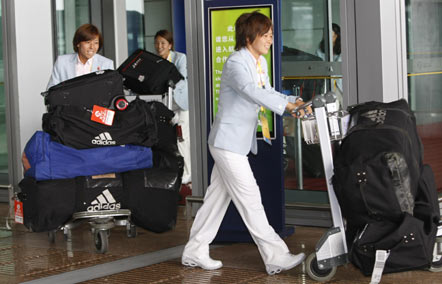Beijing will handle up to 1,500 flights and 260,000 passengers a day, the most its airport can cope with, in the run-up to and during the Olympic Games, Civil Aviation Administration of China (CAAC) officials have said.
 |
|
Japanese athletes arrive at the Beijing Capital international airport July 31, 2008, ahead of the Beijing Olympics. Beijing will handle up to 1,500 flights and 260,000 passengers a day, the most its airport can cope with, in the run-up to and during the Olympic Games. [Agencies]?? |
The challenge Beijing faces is evident from the fact that Athens handled 795 flights and 58,000 passengers on the eve of the 2004 Games' opening.
Adding to the challenge is the threat of thunderstorms on Aug 8 and 9, according to a study based on the city's decades-long weather data, said Huang Dengke, of the CAAC North China regional administration and in-charge of the airport's Games time coordination.
But contingency plans are in place, with four airports in North China chosen to handle some of the flights if Beijing encounters bad weather or air traffic congestion, Huang said. The four airports are in Tianjin, Shijiazhuang, Taiyuan and Hohhot, and together they have 100 parking bays ready for emergency landings.
The CAAC has imposed a five-hour air traffic ban at the Beijing airport between 7 pm and midnight on Aug 8, the opening day of the Games, in line with the practice adopted by previous host cities, CAAC deputy head Yang Guoqing said.
The CAAC estimates that the busiest time for aviation and airport authorities will be between Aug 6 and 11, and peak on Aug 7.
The number of landings and take-offs will increase by 20 percent, compared with normal days, during the period, and the volume of passengers by 25 percent, Yang said.
To cope with the unprecedented increase in the number of flights and passengers, part of Terminal 3 will only receive Olympic guests, including more than 10,000 athletes. Terminal 3 is the world's largest and was opened in March.
The newly built VIP terminals will handle special flights carrying 80 heads of state, and 160 chartered and 1,000 business flights.
Yang said the increase in the number of special flights will not disrupt ordinary passenger flights.
The CAAC has tightened security checks at airports since July 20 to foil any terrorist attack. It has been collaborating closely with other departments to verify and analyze information on possible terrorist threat, Yang said.
Some international terrorist groups, including the Eastern Turkistan Islamic Movement, have threatened to attack Olympic venues. Security officers in the Xinjiang Uygur autonomous region busted a terrorist plot to hijack a plane bound for Beijing this March.
But airport manager Zhang Zhihong said security forces are ready to deal with any eventuality. "We will ensure 100 percent security for the airport and the Games," he told journalists at the airport.
(China Daily/Agencies August 1, 2008)